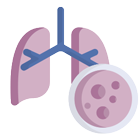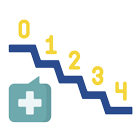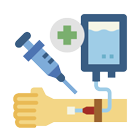
Living With Lung Cancer
About Lung Cancer

What is Lung Cancer
Learn more about what the lungs do, what primary and secondary cancer are, different types of lung cancer, how common lung cancer is, the causes and risk factors for lung cancer, how it can affect you, if there is a cure, and what the treatments are.

Symptoms
Expand your knowledge of the symptoms of lung cancer, including cough, breathing problems, fever, appetite or weight loss, fatigue and weakness, shoulder, chest, or rib pain, bone pain, finger changes, swelling of your face or neck, and blood clots.

Types of Lung Cancer
Deepen your understanding of the types of lung cancer, including small cell lung cancer, non-small cell lung cancer, and other types of lung cancer. Find out why the type of lung cancer you have is important, and how to find out what type of lung cancer you have.

Staging
Uncover the meaning of lung cancer stages, why the stage of lung cancer is important, what are the different stages of lung cancer, and why the stage of lung cancer can affect treatment options.

Resources
View other reputable sites to learn more about lung cancer and see useful links and resources.
Causes and Risk Factors

How Common is Lung Cancer
Discover how common globally lung cancer is.

Risk Factors
Gain insights into risk factors such as smoking and exposure to second-hand smoke, previous radiation therapy, air pollution, related diseases, family history, and age. Learn more about exposure to: radon, asbestos, arsenic, or other workplace chemicals.

Reducing Risks
Get additional information on areas that will reduce your risk of lung cancer, such as to stop or reduce tobacco use, avoid second-hand smoke, follow workplace safety rules, test your home environment, eat and drink well and exercise.
Testing and Treatment

Diagnostic Tests
Increase your awareness why lung cancer tests are needed, what is involved in checking your medical records, physical examination, blood tests, imaging tests, tissue samples, and biomarker tests.

Lung Cancer Screening
Explore why lung cancer screening is important, what it is, who can participate, what it involves, benefits, limitations, and how to find out more information.

Treatment Options
Get more details about treatments available for lung cancer, such as surgery, chemotheraphy, radiotherapy, chemoradiotherapy, targeted therapy, immunotherapy, ablation, laser therapy, and diathermy. See if you can take part in a clinical trial, and get help to stop smoking.

Clinical Trials
Find out what clinical trials are, how they work, what the different phases are, advantages, risks, what you need to know before, and how you can take part in a clinical trial.
Patient Stories
My Lung Cancer Story – Merel Hennink
My Lung Cancer Story – Shaun Hill
My Lung Cancer Story – Annette Hans
My Lung Cancer Story – Christian Schmitt-Plank
My Lung Cancer Story – Shani Shilo
My Lung Cancer Story Biomarker Edition – Amy Clark
My Lung Cancer Story Biomarker Edition – Nicola Mansi (Italian)
My Lung Cancer Story Biomarker Edition – Yvonne Diaz
My Lung Cancer Story Biomarker Edition – Jan Clark
My Lung Cancer Story Biomarker Edition – Felicina Tallarico IT (Italian)
My Lung Cancer Story Biomarker Edition – Stephanie Oyonarte da Rocha (Spanish)
My Lung Cancer Story Biomarker Edition – Maria Angeles Marín (Spanish)
My Lung Cancer Story – Merel Hennink


